Fleurs du Mal Magazine


The armed conflict in the east of Ukraine in 2017 brought about an emergence of a distinctive trend in contemporary Ukrainian poetry: the poetry of war.
 Directly and indirectly, the poems collected in this volume engage with the events and experiences of war, reflecting on the themes of alienation, loss, dislocation, and disability; as well as justice, heroism, courage, resilience, generosity, and forgiveness.
Directly and indirectly, the poems collected in this volume engage with the events and experiences of war, reflecting on the themes of alienation, loss, dislocation, and disability; as well as justice, heroism, courage, resilience, generosity, and forgiveness.
In addressing these themes, the poems also raise questions about art, politics, citizenship, and moral responsibility. The anthology brings together some of the most compelling poetic voices from different regions of Ukraine. Young and old, female and male, somber and ironic, tragic and playful, filled with extraordinary terror and ordinary human delights, the voices recreate the human sounds of war in its tragic complexity.
Oksana Maksymchuk is an author of two award-winning books of poetry in the Ukrainian language, and a recipient of Richmond Lattimore and Joseph Brodsky-Stephen Spender translation prizes. She works on problems of cognition and motivation in Plato’s moral psychology. Maksymchuk teaches philosophy at the University of Arkansas.
Max Rosochinsky is a poet and translator from Simferopol, Crimea. His poems had been nominated for the PEN International New Voices Award in 2015. With Maksymchuk, he won first place in the 2014 Brodsky-Spender competition. His academic work focuses on twentieth century Russian poetry, especially Osip Mandelshtam and Marina Tsvetaeva.
Published by Academic Studies Press (Boston, MA) and Harvard Ukrainian Research Institute (Cambridge, MA), Words for War: New Poems from Ukraine is available in hardback, paperback, and digital ebook formats.
New Poems from Ukraine by:
Anastasia Afanasieva
Vasyl Holoborodko
Borys Humenyuk
Yuri Izdryk
Aleksandr Kabanov
Kateryna Kalytko
Lyudmyla Khersonska
Boris Khersonsky
Marianna Kiyanovska
Halyna Kruk
Oksana Lutsyshyna
Vasyl Makhno
Marjana Savka
Ostap Slyvynsky
Lyuba Yakimchuk
Serhiy Zhadan

# new poetry
Words for War: New Poems from Ukraine
Edited by Oksana Maksymchuk & Max Rosochinsky
with an introduction by Ilya Kaminsky and an afterword by Polina Barskova
Publisher: Academic Studies Press
Series: Ukrainian Studies
Pages: 242 pp.
16 illus. (color)
Publication Date: December 2017
English
ISBN: 9781618116666 (cloth) 32,99 euro
ISBN: 9781618118615 (paper) 24,99 euro
More information: https://www.wordsforwar.com/
• fleursdumal.nl magazine
More in: #Modern Poetry Archive, #More Poetry Archives, *War Poetry Archive, - Book News, - Book Stories, Archive Y-Z, REPRESSION OF WRITERS, JOURNALISTS & ARTISTS, WAR & PEACE, Yakimchuk, Lyuba
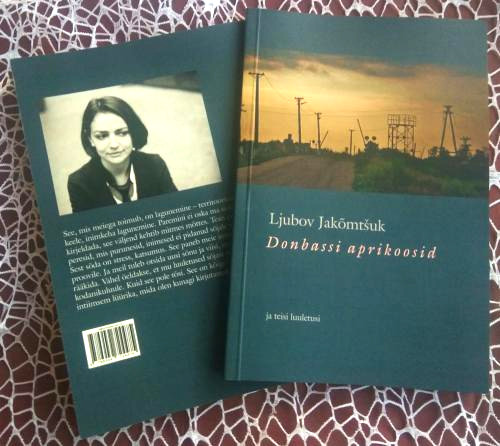
we will walk back, even with bare feet
if we don’t find our home in the place where we left it
we will build another one in an apricot tree
out of luscious clouds, out of azure ether
Apricots of Donbas—by award-winning contemporary Ukrainian poet Lyuba Yakimchuk—is the 7th book in the Lost Horse Press Contemporary Ukrainian Poetry Series. As are previous volumes in the Series, it has been released in a dual-language edition.
Born and raised in a small coal-mining town in Ukraine’s industrial east, Yakimchuk lost her family home in 2014, when the region was occupied by Russian-backed militants, and her parents and sister were forced to flee as refugees.
Reflecting the complex emotional experiences of a civilian witnessing a gradual disintegration of her familiar surroundings, Yakimchuk’s poetry is versatile, ranging from sumptuous verses about the urgency of erotic desire in a war-torn city to imitations of child-like babbling about the tools and toys of military combat.
Playfulness in the face of catastrophe is a distinctive feature of Yakimchuk’s voice, evoking the legacy of the Ukrainian Futurists of the 1920s. The poems’ artfulness goes hand in hand with their authenticity, offering intimate glimpses into the story of a woman affected by a life-altering situation beyond her control.
(…)
my friends are hostages
and I can’t reach them, I can’t do netsk
to pull them out of the basements
from under the rubble
yet here you are, writing poems
ideally slick poems
high-minded gilded poems
beautiful as embroidery
there’s no poetry about war
just decomposition
only letters remain
and they all make a single sound — rrr
(…)
Lyuba Yakimchuk from Decomposition,
translated from the Ukrainian by Oksana Maksymchuk and Max Rosochinsky
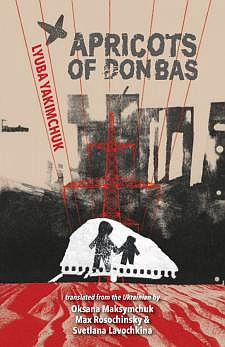 Lyuba Yakimchuk
Lyuba Yakimchuk
is a poet, playwright, and screenwriter. Her two collections of poetry, Moda (2009) and Abrykosy Donbasu (2015) won prestigious awards, including the International Slavic Poetic Award (Ukraine) and the International Poetic Award of the Kovalev Foundation (USA). Since 2019, her play The Wall has been running at the Ivan Franko National Academic Drama Theater, the largest in Ukraine. She also authored the script for the film The Slovo House: An Unfinished Novel, reflecting on the literary life in the 1930’s Kharkiv. Born and raised in a small town near Luhansk, Yakimchuk now lives in Kyiv, Ukraine.
Born and raised in a small coal-mining town in Ukraine’s industrial east, Yakimchuk lost her family home in 2014 when the region was occupied by Russian-backed militants and her parents and sister were forced to flee as refugees. Reflecting her complex emotional experiences, Yakimchuk’s poetry is versatile, ranging from sumptuous verses about the urgency of erotic desire in a war-torn city to imitations of childlike babbling about the tools and toys of military combat. Playfulness in the face of catastrophe is a distinctive feature of Yakimchuk’s voice, evoking the legacy of the Ukrainian Futurists of the 1920s. The poems’ artfulness go hand in hand with their authenticity, offering intimate glimpses into the story of a woman affected by a life-altering situation beyond her control.
# new poetry
APRICOTS OF DONBAS
poems by Lyuba Yakimchuk
Translated by Oksana Maksymchuk,
Max Rosochinsky & Svetlana Lavochkina
Oktober 2021
Paperback
166 pp
ISBN 978-1-7364323-1-0
Lost Horse Press
$30.00
• fleursdumal.nl magazine
More in: #Modern Poetry Archive, - Book News, Archive Y-Z, Archive Y-Z, Art & Literature News, Yakimchuk, Lyuba
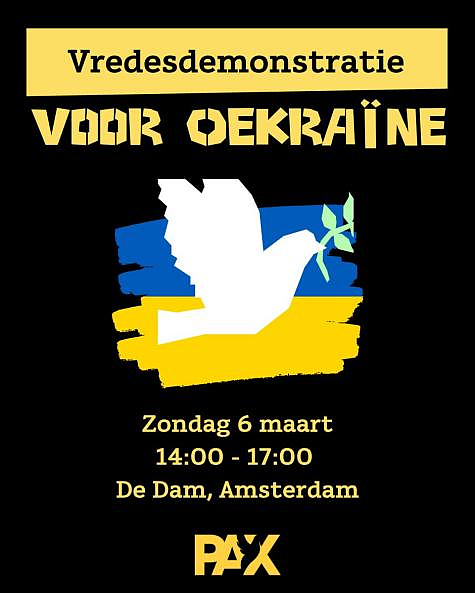
Sinds de Russische invasie in Oekraïne zijn duizenden burgers en militairen omgekomen en miljoenen Oekraïners hun land ontvlucht. Het Russische leger trekt op naar Oekraïense steden, waaronder hoofdstad Kyiv.
Het einde van deze oorlog is nog niet in zicht. Komende zondag betuigt PAX opnieuw haar solidariteit met het Oekraïense volk. Kom ook en sta zij aan zij met PAX tegen het oorlogsgeweld.
PAX is de grootste vredesorganisatie van Nederland. Zij werken aan de bescherming van burgers tegen oorlogsgeweld, aan het beëindigen van gewapend geweld en het opbouwen van inclusieve vrede. Dit doen ze in conflictgebieden wereldwijd, samen met lokale partners en mensen die, net als PAX, vinden dat iedereen recht heeft op een menswaardig leven in een vreedzame samenleving.
Steun Oekraïne en loop op zondag 6 maart 2022 om 14.00 uur mee vanaf de Dam in Amsterdam
PAX doet oproep aan alle strijdende partijen in Oekraïne om burgers te beschermen
Inzet kernwapens groot risico rond conflict Oekraïne
PAX roept op om het gebruik van clustermunitie te stoppen om burgerslachtoffers te voorkomen
# WEBSITE PAX NEDERLAND
https://paxvoorvrede.nl/wat-wij-doen
PAX strijdt zij aan zij met burgers voor vrede in conflictgebieden.
PAXVOORVREDE
• fleursdumal.nl magazine
More in: MUSEUM OF PUBLIC PROTEST, Pax for peace, REPRESSION OF WRITERS, JOURNALISTS & ARTISTS, WAR & PEACE
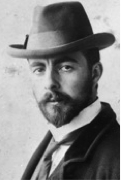
And Yet
They drew him from the darkened room,
Where, swooning in a peace profound,
Beneath a heavy fragrance drowned
Her grey form glimmered in the gloom.
Death smoothed from her each sordid trace
Of Life; at last he read the scroll;
For all the meaning of her soul
Flowered upon her perfect face.
“In other worlds her soul finds scope;
Her spirit lives; she is not dead,”
In his dulled ear they said and said,
Suave-murmuring the ancient Hope.
“You loved her; she was worthy love.
Think you her spheral soul can cease?
Nay, she has ripened to release
From this bare earth, and waits above.”
His brain their clamour heard aloof;
He, too, had said the self-same thing;
But now his heart was quivering
For more than comfort — parched for proof.
He put them from him. “Let me be;
You proffer in my bitter need
The coward comfort of a creed
That tears her soul apart from me.
“She waits in no drear Heaven afar.
Her woman’s soul in all its worth,
Yearning for me, for homely earth,
No gates of beaten gold could bar.
“No, she is near me, ever close;
One with the world, but free again;
One with the breezes and the rain;
One with the mountain and the rose.
“She knows me not; her voice is dumb;
But aching through the twilight peers,
And, unremembering, yet with tears,
She strives to say she cannot come.
“Yes, she is changed, but not destroyed;
The words that were her soul are hushed;
The gem that was her heart is crushed —
Its fragments white stars in the void.
“And I shall see her in disguise;
In the grey vistas of the street
A face that hints of her I meet;
Whispers her soul from alien eyes.
“In Time’s great garden, spring on spring,
The blossoms glow; then at a breath
Their petals flutter down to death —
Ah love, how brief your blossoming!
“Death has but severed part from part.
Borne on an ever-moving air
The fragrance of her life somewhere
Freshens some lonely wistful heart!
“No word of hers can God forget;
Her laughter Time dare not disperse;
It shakes the tense-strung universe,
And with the chord it trembles yet.
“Each mood of hers, each fancy slight,
In deep pulsations, ring on ring,
Dilating, ever-widening,
Ripples across the outer night.
“Her life with deathless charm was fraught,
And God with smiles remembers now
The puzzled pucker of her brow
Ruffled with sudden gusts of thought.
“And in His cosmic memory wise
Still live her subtle features thin,
Her dear iconoclastic chin,
The grave enigma of her eyes.
“And if beyond she might draw breath.
And know that I was not with her,
The wistful eyes of her despair
Would be more desolate than death.
“But not to meet her in the wide
Night-spaces I must wander through;
To kiss the pretty pout I knew,
And nevermore to hear her chide;
“To speak those childish words that were
So foolish-sweet, so passionate-wise;
Her subtle fragrance recognise
And hear the whispers of her hair! . . .
“Her sun has set; but still, sublime,
She is a star, of God a part;
She is a petal at the heart
Of the eternal flower of Time.
“I triumph so beyond regret,
I win her immortality:
Where, Death, your vaunted victory?
Where, Grave, your sting? And yet — and yet——!”
Arthur Adams
(1872-1936)
And Yet
• fleursdumal.nl magazine
More in: Adams, Arthur, Archive A-B, Archive A-B
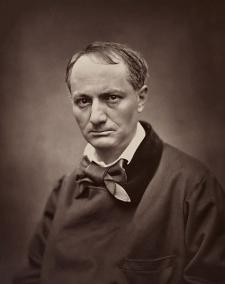
Je n’ai pas oublié,
voisine de la ville
Je n’ai pas oublié, voisine de la ville,
Notre blanche maison, petite mais tranquille;
Sa Pomone de plâtre et sa vieille Vénus
Dans un bosquet chétif cachant leurs membres nus,
Et le soleil, le soir, ruisselant et superbe,
Qui, derrière la vitre où se brisait sa gerbe
Semblait, grand oeil ouvert dans le ciel curieux,
Contempler nos dîners longs et silencieux,
Répandant largement ses beaux reflets de cierge
Sur la nappe frugale et les rideaux de serge.
Charles Baudelaire
(1821 – 1867)
Je n’ai pas oublié, voisine de la ville
Fleurs du mal (Flowers of Evil)
• fleursdumal.nl magazine
More in: Archive A-B, Archive A-B, Baudelaire, Les Fleurs du Mal
Thank you for reading Fleurs du Mal - magazine for art & literature